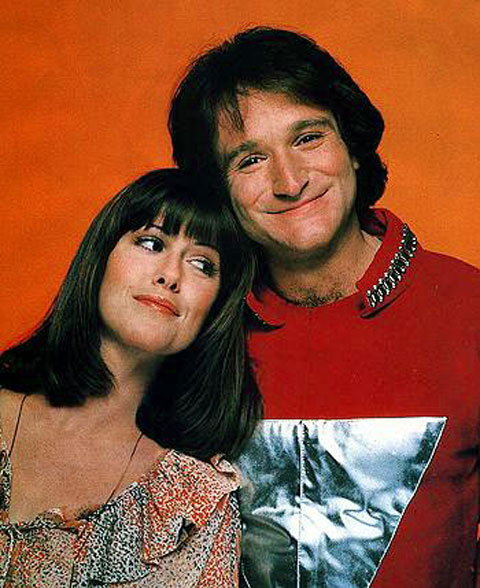A CONSTANT QUALITY: ROBIN WILLIAMS, 1951-2014

It's hard to choose a single moment that represents the career ofRobin Williams, who was found dead this morning of an apparent suicide at 63. Somehow they all seem representative. The Chicago-born, Michigan-raised actor's performances shaded antic clowning with deep melancholy, and vice versa. There were flashes of anarchic joy in his grimmest roles, and moments even in his most outwardly featherweight performances when it seemed as though a cloud had passed across his face. Last seen on TV in "The Crazy Ones," a CBS series set at a Chicago ad agency, Williams battled drug problems and depression throughout his life. Although he had crests and troughs, the light never traveled far from the darkness or the darkness from the light. Like Jack Lemmon, you could believe Williams as a man standing on a ledge or walking on air.
That was the most surprising and often haunting thing about Williams: that sense that when he unleashed the full force of his talent—chasing a spark of inspiration as it hopped from neural pathway to neural pathway like a speed-demon driver changing lanes; rattling off free-associative thoughts that were sometimes connected by shared words or images or vowel sounds; pacing or racing while yammering and gesturing as if his whole being were taking dictation from his subconscious—he was reaching out to the audience and running away from something.
"He could make everybody happy but himself," said Garry Marshall, who cast Williams in a star-making role as Mork from Ork on ABC's "Happy Days" and its long-running spinoff, "Mork & Mindy." Whether playing comedic or dramatic roles or doing standup routines or goofing around on talk shows, he never stayed in one mode for long. And it wasn't just gradations of fun. You always sensed the darkness lurking. He could be sweet or silly for a while, or light and sweet; then you'd get a flash of anger or bitterness that seemed to erupt from nowhere and that did not seem fake, and then he'd slip back into sweet or silly, and make everyone laugh again.
"When he appeared on the Jonathan Ross show earlier this summer, he'd been vintage Williams, hyperactive to the point of deranged, ricocheting between voices, riffing off his internal dialogues," wrote The Guardian's Decca Aitkenhead in a 2010 profile pegged to "World's Greatest Dad," a pitch-black comedy with unbearably painful dramatic passages, many of which revolve around a suicide note. "Off-camera, however, he is a different kettle of fish. His bearing is intensely Zen and almost mournful, and when he's not putting on voices he speaks in a low, tremulous baritone–as if on the verge of tears–that would work very well if he were delivering a funeral eulogy." Anyone who knew Williams or spoke to him for any length of time or simply studied the man sensed this, and understood it. Somehow none of it seemed incongruous or inappropriate because he was Robin Williams, and Robin Williams was everywhere and everyone at once, look out.

Continue reading here : Roger Ebert

No comments:
Post a Comment